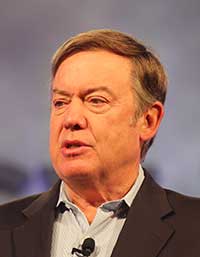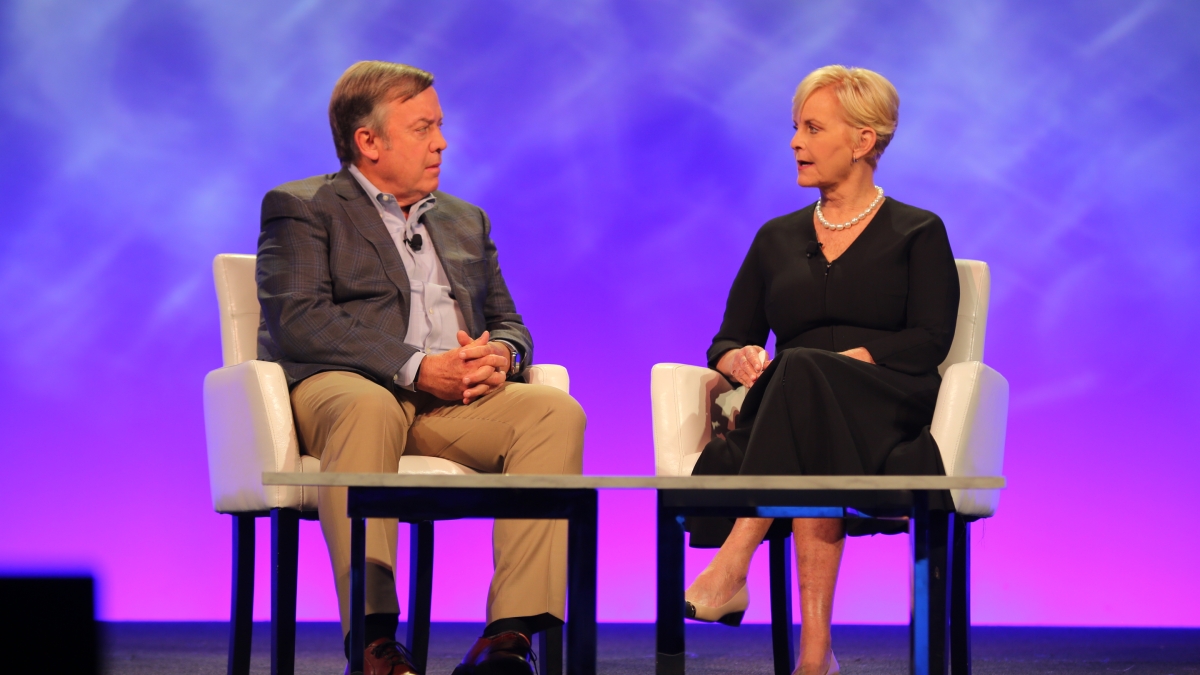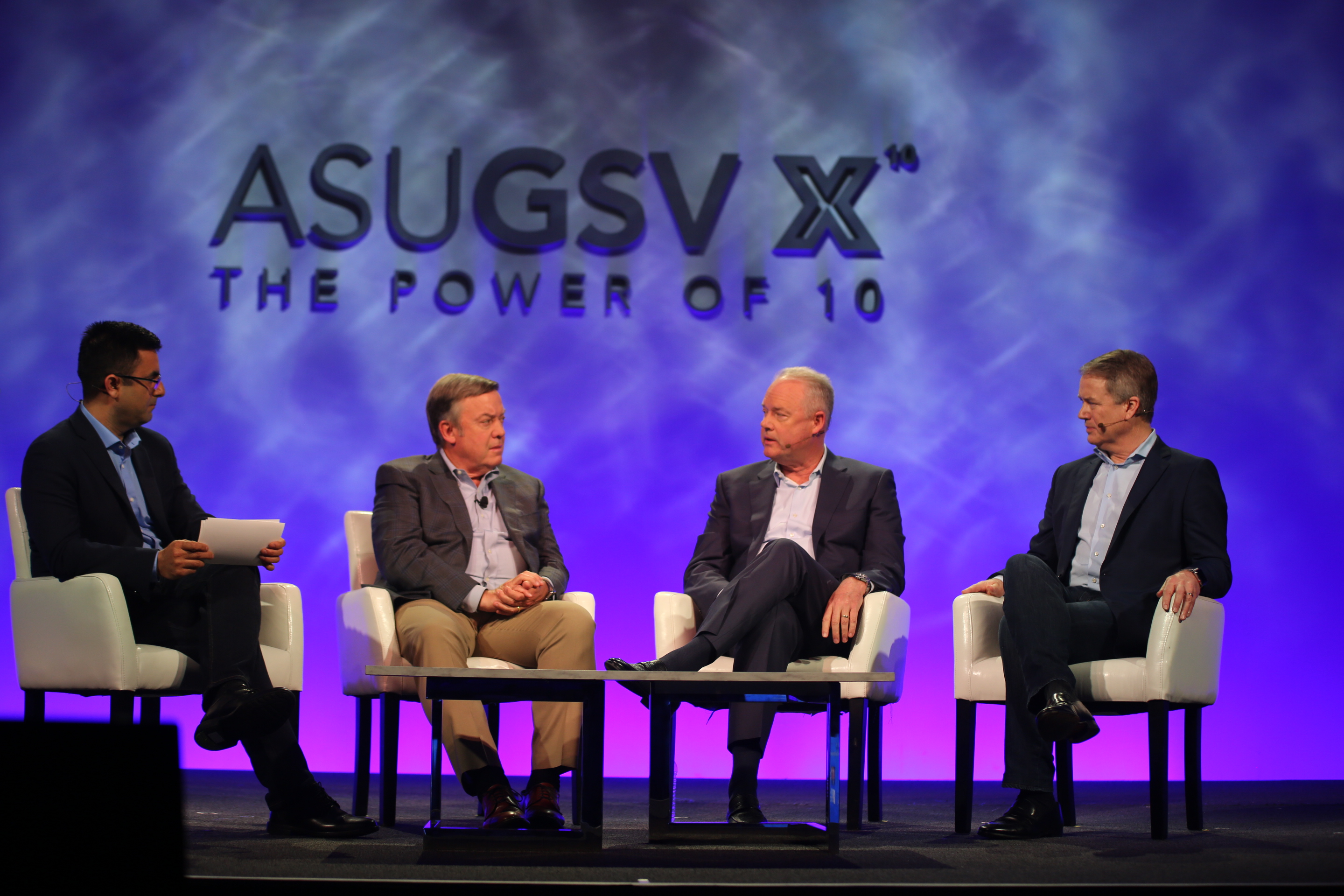The ASU GSV Summit, which explores innovation and technology in education with a range of keynotes and industry experts, celebrated its 10th year at its annual conference this week in San Diego.
At several livestreamed events Monday and Tuesday, Arizona State University President Michael M. Crow discussed the access mission of higher education.
Empowering refugees with education
Crow held a “fireside chat” with Cindy McCain (pictured above), widow of the late Sen. John McCain, on Monday. They discussed her work with the McCain Institute for International Leadership at ASU in working with vulnerable populations around the world and the politically divisive atmosphere right now.
Technology and education is life-changing, McCain said.
“You take a country like Congo or Nigeria, a little bit of education can make a world of difference, especially when you’re talking about women’s empowerment,” she said.
Most people don’t want to believe that human trafficking exists in North America.
“To them, it happens in Vietnam, Cambodia or some place in Africa, but it happens right there,” she said. “Education is a large part of this, not only knowing what it is but knowing what you can do to stop it.”
Crow said that ASU is involved in deploying education assets to refugee areas in Africa and the Middle East.
“We’re using tools we’ve developed with companies here to project educational content and to allow us to create learning environments,” he said. “But the refugee situations are so large and complex and so daunting.”
RELATED: ASU offering rapidly deployable online courses to refugees
McCain said that it’s difficult to imagine a situation in which your only hope of saving your child is to leave your country.
“So what you end up with is the most vulnerable people who end up in the hands of traffickers,” she said. “Education becomes primary in this — not just educating them on the ability to understand what trafficking is so they can save themselves, but to continue their existence.”
Crow noted that the McCains spent more than 30 years in politics and that the current climate is based on partisanship.
“George Washington gave his inaugural address in 1790 and he talked about how to move the country forward, and he was very much against political parties,” he said.
“He said we could end up in a country in the distant future, where the parties become the actual contest rather than the ideas. Here we are 200-plus years later. Now it does seem like it’s more important for red to beat blue or for blue to beat red.”
McCain said that Americans can reclaim power by voting and by telling leaders “what you want, not what they want.”
“I also believe in the goodness of America,” she said. “I’ve lived long enough to see this pendulum swing from side to side to side, and I believe it will swing back and we’ll see this country change again for the right reasons. We’re being tested.”
Crow asked McCain about her husband’s legacy and the McCain Institute, which is housed at ASU in Washington, D.C., and gathers young leaders from around the world to learn about values and ethics.
“I had a long time while he was ill to talk to him about this,” she said. “It’s about a commitment to human rights, freedom of the press, cybersecurity and all the things that meant a great deal to him,” she said.
“It’s making sure we continue the discussions and the disagreements and begin to understand not only what’s important but how we can be a part of making it better.
“He was the eternal optimist.”
At a Monday afternoon panel, (from left) moderator and InStride CEO Vivek Sharma, ASU President Michael M. Crow, Starbucks CEO Kevin Johnson and Steve Ellis, managing partner at TPG Growth and the Rise Fund, discuss the ways in which companies can help their employees' education journey. Photo by Robert Behnke/EdPlus at ASU
Helping companies create lifelong learners
Crow also spoke on a panel Monday that explored how companies should help their employees attain higher education and have a more humane view of the labor force.
“In the past, in American capitalism, we viewed labor as a commodity,” he said.
“I’m hoping companies will take a new view of the worker, as a human being that each company has a responsibility to help move forward and be adaptable for the next job — maybe in another company. It’s a whole new way to think about human capital as more than just a commodity.”
Last week, ASU announced that it is partnering with the Rise Fund — a global impact investing fund managed by TPG — on a new education enterprise called InStride, which will collaborate with employers to provide university degrees for employees. As the economy increasingly demands workers with knowledge and skills, university degrees — and the opportunity to pursue a higher education — become increasingly crucial. As the link between universities and employers, InStride aims to facilitate partnerships that will positively impact the lives of thousands of people.
ASU’s successful partnership with Starbucks, the Starbucks College Achievement Plan, is the catalyst for the new company, with plans for more employers and universities to be added in the coming months.
ASU, as the first university partner in this effort, offers a unique technology platform designed for scalable delivery of digital teaching and learning models to increase student success and reduce barriers to achievement in higher education. ASU Online offers more than 175 bachelor’s degrees, master’s degrees and certificate programs. InStride will work with employers to build education partnerships with ASU and other universities that meet the needs of their employees.
Kevin Johnson, CEO of Starbucks, said on Monday that his company’s purpose is about more than profits.
“About five years ago, we observed that we have many partners struggling under loads of student debt to finish their educations,” he said. “It’s about helping our partners get that education that was out of reach.”
Johnson said about 12,000 Starbucks employees, called partners, are taking ASU classes through the program, with about 3,000 graduates so far.
“We find now that 50 percent of the graduates stay at Starbucks and get promoted faster and about 50 percent move on,” he said. “In new applicants for jobs at Starbucks, nearly 20 percent indicate their primary reason is to get an education in partnership with ASU.”
Steve Ellis, managing partner at TPG Growth and the Rise Fund, said that a new model of education accessed via the workplace could help ease income inequality.
“We know that between a third and one half of income inequality, which has expanded dramatically over the years, can be attributed to a lack of high-quality continuing education,” he said.
“What would it take for us to create a movement that would make this a responsibility of all corporations and organizations? There was more than $800 billion of company stock bought back in 2018. What if we spent a tiny fraction of that to create programs like the Starbucks College Achievement Plan?”
Crow said that the old-fashioned linear model of education in which children go to school, then college and then the workplace — and are finished with education — no longer works.
“Let’s make every organization a learning enterprise. Let’s surround people with opportunities to learn and stop judging them based on their age or what neighborhood they came from or whether they got a B in college algebra in 1980,” he said.
“We all know that it’s about whether we can help people to fulfill the totality of their potential,” he said.
Making the case for lifelong learning
Crow elaborated on the need for lifelong education at the keynote address on Tuesday morning, saying that rapid technological change will require workers to keep learning.
“We’d like to work against income disparity, and we’d like to provide for rapid economic growth,” he said. “We’d like to not have these huge ups and downs in the current cycle of the economy.”

Michael M. Crow
Crow said the current linear system of K-12, then vocational school or college, then workplace, is inadequate.
“It’s poorly designed, and it’s useful for the past but not useful for the future,” he said.
A universal learning system would provide opportunities for education throughout the lifespan and be accessible in the workplace. But designing that model is very difficult because there are many types of universities, and they all operate very differently from corporations.
“There’s nothing systematic at scale given the tens of millions of people in the workplace who have not attained a higher level of credential,” he said.
So this would require a new kind of entity — a “boundary-spanning organization” — to take the knowledge content provided by the universities and customize it for access by the companies’ workforce.
“The mediating organization has a special set of skills and talent and the ability to understand the two different clock speeds and cultures,” he said.
“It would have the ability to design the special interfaces needed, the people and the technology and the analytics.”
Crow visualized the scenario as two blocks of Legos, the university and the company, connected by a white Lego, the mediating company.
“At ASU, we’ve been thinking about how we do this. We have lots of experience in building these kinds of relationships on our own,” he said, citing education partnerships with Starbucks, adidas and Uber.
“These are going very well, but we realized immediately that back at the university, our skill set is not best at designing these white Legos. It’s a completely different set of skills,” he said.
ASU has taken a step toward creating this model through the new InStride partnership, he said.
But scaling that design will require significant changes:
- New technologies, such as artificial intelligence-based advising and teaching for every life stage.
- New policies, such as the creation of a new tax-advantaged, employer-sponsored tuition savings account and a new higher-education classification system.
- New mindsets, such as a creation of a culture of reward around education and an increased awareness that learning doesn’t end at an arbitrary age.
Crow referenced the recent scandal in which wealthy parents were charged with bribing to get their children admitted to some universities.
“It means something is wrong with the design,” he said.
“But if you’re learning throughout your entire life, maybe you go to college when you’re 18 or 28 or 38. It’s a system that needs some serious rethinking.”
Top photo: ASU President Michael M. Crow and Cindy McCain talk about populations made vulnerable by unstable political situations and the role of education Monday at the ASU GSV Summit in San Diego. Photo by Robert Behnke/EdPlus at ASU
More Science and technology

ASU researcher part of team discovering ways to fight drug-resistant bacteria
A new study published in the Science Advances journal featuring Arizona State University researchers has found vulnerabilities in certain strains of bacteria that are antibiotic resistant, just…

ASU student researchers get early, hands-on experience in engineering research
Using computer science to aid endangered species reintroduction, enhance software engineering education and improve semiconductor material performance are just some of the ways Arizona State…

ASU professor honored with prestigious award for being a cybersecurity trailblazer
At first, he thought it was a drill.On Sept. 11, 2001, Gail-Joon Ahn sat in a conference room in Fort Meade, Maryland. The cybersecurity researcher was part of a group that had been invited…

